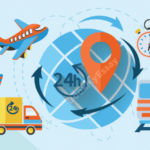Another shortage, another challenge
We talked about how the driver shortage and federal regulations impact the freight industry, but what other challenges are there? One of the major challenges that has come about since the COVID pandemic is an equipment shortage.
We’ve all seen the empty lots at car dealerships over the last year or two. We’ve heard about the delay in receiving chips to make the technology inside the vehicles function properly.
The transportation industry is no exception to these issues.
According to the American Trucking Associations, about 72% of America’s freight is transported by truck. They estimate that we are currently dealing with a shortage of about 80,000 truck drivers and predict that number could double by 2030. But what good are truck drivers if we don’t have the trucks to put them in?

In January, some semi-truck dealers reported they were already sold out of new 2022 trucks, according to The Business Insider. Being sold out for the year has already created a year long waiting list. The global shortage of computer chips has cut production levels for semi-trucks.
Like everything else, costs continue to rise. The costs of component parts are so high it has created problems when quoting a good price. This is proving difficult for companies to make money on the equipment but provide a cost that customers can handle.
The Business Insider also indicated that the shortage has made semi-trucks increasingly valuable. They stated, “In August (2021), J. D. Power reported that Class 8 truck sales prices climbed over 86% compared to the first seven months of the previous year. And prices are expected to continue to rise in 2022.”
The fact that this problem is only getting worse doesn’t bode well for the freight market. A truck you could have purchased for about $40,000 a year ago will cost every bit of $60,000 today. Yikes!

Is anything being done to combat this problem? Maybe, but not much (if anything) that will have a short-term impact. One of the most talked about changes- electrification/automation. But we will wait to discuss that in a future blog.


